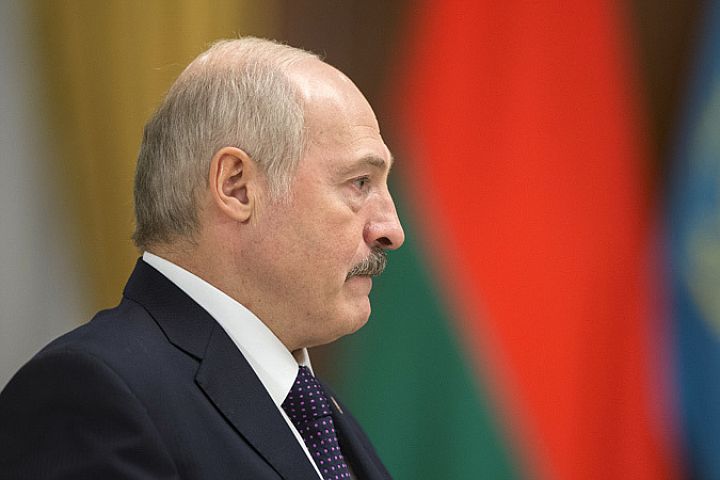
Belarus Comes Under Criticism From Both Sides
Publication: Eurasia Daily Monitor Volume: 12 Issue: 72
By:

A worsening economy, a strengthening national identity, a demographic recovery, and growing Russian criticism of Belarus’s sense of nationhood apart from Russia continue to dominate the news emanating from Belarus. In February 2015, registered economic output was 3 percent below that in February 2014; throughout the first two months of the year, exports shrank by 29.4 percent and imports by 30.9 percent (Infofocus, March 2015). Due to diminished global oil prices, Belarus is also losing hard currency revenues. Although last year’s exports of refined oil increased by 1.6 percent, amounting to 13.8 million tons, revenues actually shrank by 1.9 percent, down to $9.96 billion (Naviny.by, April 4).
On the brighter side, in 2014, the population of Belarus increased for the first time in 20 years (from 9,458,164 to 9,480,868). This increase resulted from positive net migration to Belarus, which more than offset the excess of deaths over births. That excess, however, amounted to just 3,000 in 2014, or ten times less than in 2010. More than half of all births in 2014 were births of second and subsequent children—a promising sign (Belorusy i Rynok, April 6–12).
It is not just Belarus’s “demographic situation” that is becoming more wholesome. National polls by the Independent Institute for Socio-Economic and Political Studies reveal that from 2002 to 2015, the share of Belarusians claiming they are different from Russians in terms of culture and traditions steadily increased from 27.3 percent to 36.3 percent. Conversely, the proportion of Belarusians believing they are no different from Russians steadily declined from 44 percent to 32.5 percent. Language, however, is not a factor of the growing sense of separation from their eastern neighbors. On the contrary, from 2002 to 2015, the proportion of Belarusians who think that their difference from Russians has to do with language declined from 39.1 percent to 24.6 percent (Tut.by, April 6).
Also indicative of Belarus’s growing sense of separation from Russia was a recent publicized exchange between Gennadz Davydska, the chairman of the Belarusian State TV and Radio Company (BSTVRC), and Alexei Yanukevich, who heads the Belarusian Popular Front, the oldest and most well-known opposition party of Belarus. In a letter to Davydska, Yanukevich complained that Russian TV propaganda, particularly the NTV channel, which is accessible in Belarus, “instigates inter-ethnic enmity and runs contrary to the policy of information security of the Republic of Belarus and of the official standpoint of our country in regard to sovereignty, territorial integrity and independence of Ukraine.” Davydska replied that the Belarusian subsidiary of NTV, which also functions under the patronage of BSTVRC, mitigates Russian propaganda and stops short of broadcasting the most radical-sounding programs. The fact that Davydska, who is President Alyaksandr Lukashenka’s appointee, took the trouble to respond in this way and that his response was made public is quite noteworthy (Tut.by, April 3).
In turn, Russia has stepped up its media campaign of castigating Belarus for distancing itself from Moscow. “Russian propaganda turns on Belarus,” claims Adaria Gushtyn, a new political commentator for Belorusskie Novosti. She gives multiple examples of Russian TV talk shows castigating Belarus for its growing “nationalism” (Naviny.by, April 11). Meanwhile, the most radical view of Belarus has indeed been presented by the columnist Eduard Birov (see EDM, April 14), who suggests that, faced with the attempts by the “agonizing West to ruin the entire world and Russia in the first place, it is impossible to sit in separate national compartments anymore” (Vzglyad, April 7). Consequently, he argues, Belarus should quickly unite with Russia.
A recent series of articles published by Regnum are similar in tone. Thus, Russian commentator Nikolai Radov warns that “the political will and ambitions of one man [i.e., Lukashenka] may soon collide with [Belarus’] national interests,” which are to stay closely allied with Russia (Regnum, April 7). And Nikolay Shiptenko claims that the upcoming Riga summit of the Eastern Partnership, in which Belarus may be represented at the highest level, bears an imprint of the Munich 1938 sellout to Adolf Hitler. Shiptenko’s point is that Western leaders have, allegedly, always been duplicitous and pragmatic toward those totalitarian regimes that suit their interests. In that spirit, the West is now helping Lukashenka to “demoralize the pro-Western opposition and, thus, supply grist for the mill of Europe’s last dictator” (Regnum, April 3). Less ominous in tone but similar in content is the publication by Viacheslav Samoilov titled “Will Lukashenka quaver?” Samoilov actually praises Lukashenka for how he cares about the wellbeing of his fellow countrymen, for saving domestic industry, ensuring good roads, and maintaining excellent education and healthcare facilities. But he ends his piece by warning Belarus against currying favor with the West, as Belarus may find itself under a “colonial Euro-Atlantic administration” (Stoletie, April 7).
It is ironic that the argumentation employed by multiple Russian critics of Belarus’s rapprochement with the West impeccably dovetails with that used in a rare publication on Belarus in a mainstream Western media outlet. In an article for The American Interest, Joerg Forbrig suggests that the United States should ignore Lukashenka’s appeal to show up at the negotiation table with Russia about Ukraine because this appeal “is designed to please Russia” (The American Interest, April 10). So whereas, in the eyes of Russians, Lukashenka is trying too hard to please the West, his US critics present a symmetrical but opposite accusation. Yet, because Lukashenka has shown signs of being less of a straight-line thinker than most of his critics, it is unlikely the Belarusian president expects his appeal to the US to be taken at face value. More likely, he wants to attract additional attention to himself and to Belarus’s precarious position vis-à-vis Russia.




